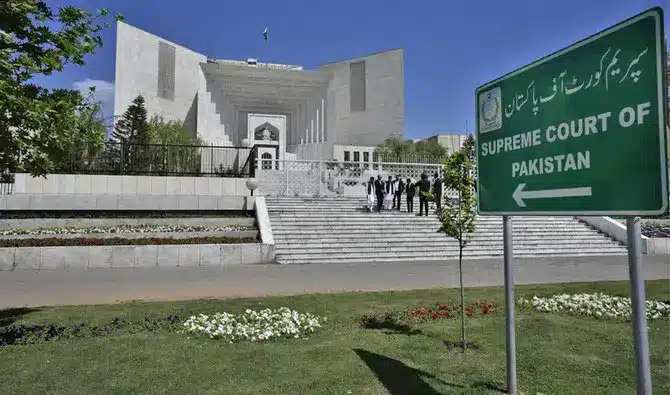SC judge : Civilians to face military trial for Army Act offences
Justice asks whether an executive body can act as both accuser and judge.
Defence ministry’s counsel argues Army Act not limited to armed forces.
SC bench orders Punjab govt to respond to complaints regarding jail protocols.
ISLAMABAD: Supreme Court’s Justice Muhammad Ali Mazhar said on Tuesday that the civilians would not face a military trial merely for standing near an army checkpoint but, they certainly would if they committed an offence listed under the Army Act.
The remark was passed during a constitutional bench’s hearing of a case centred on appeals against decisions allowing civilian trials in military courts. It came in response to Justice Musarrat Hilali’s concern over “extension of powers” to try civilians under the Army Act, while the question remains whether the civilians can be tried in military courts.
During the proceedings, Khawaja Haris, representing the Ministry of Defence, argued that the apex court had previously ruled that civilians could be court-martialed under specific circumstances.
At this, Justice Mandokhail raised constitutional concerns, questioning whether an executive body like the Ministry of Defence could act as both accuser and judge. “The constitution clearly prohibits the executive from performing judicial functions,” he remarked
Haris argued that the Army Act was not limited to armed forces personnel, encompassing various categories, including civilians in specific situations. However, Justice Jamal questioned whether criminal matters could fall under Article 8(3), which pertains to military discipline.
Responding to this, Haris concurred that the members of the Pakistan Armed Forces are just as much citizens as any other citizens.
The constitutional bench sought clarity on whether extending military jurisdiction to civilians was constitutional. Justice Mandokhail further questioned whether joining the armed forces deprived individuals of fundamental rights, noting that the Army Act was introduced to maintain military discipline, not to curtail civilian rights.
Allegations of unfair treatment in Lahore jail
At the hearing’s conclusion, Hafeezullah Niazi, a senior journalist and father of a convicted civilian, raised concerns over the treatment of his son, who was transferred to prison following a recent military court sentence.
“Despite being moved to jail, my son is not being treated as per the jail manual,” Niazi stated, highlighting that 22 convicts are held in Lahore Jail’s high-security zone under similar conditions.
Justice Musarrat Hilali remarked that the Supreme Court had directed authorities to ensure compliance with the jail manual. She said that Punjab and federal governments were “disregarding court orders”.
Meanwhile, Justice Muhammad Ali Mazhar pointed out that these individuals were not under trial but had already been sentenced, some receiving two- to ten-year sentences. The court also noted that detailed reasons for these sentences had not been provided.
The court requested reports from the Punjab government regarding the treatment of convicts transferred from military courts, demanding transparency about whether they were being treated in line with the jail manual.
Constitutional bench’s head Justice Ameenuddin directed the Punjab government to respond to Niazi’s complaints, ensuring adherence to legal protocols.
Later, the court adjourned the proceedings till tomorrow (Wednesday). Defence ministry’s lawyer will continue his arguments tomorrow.

